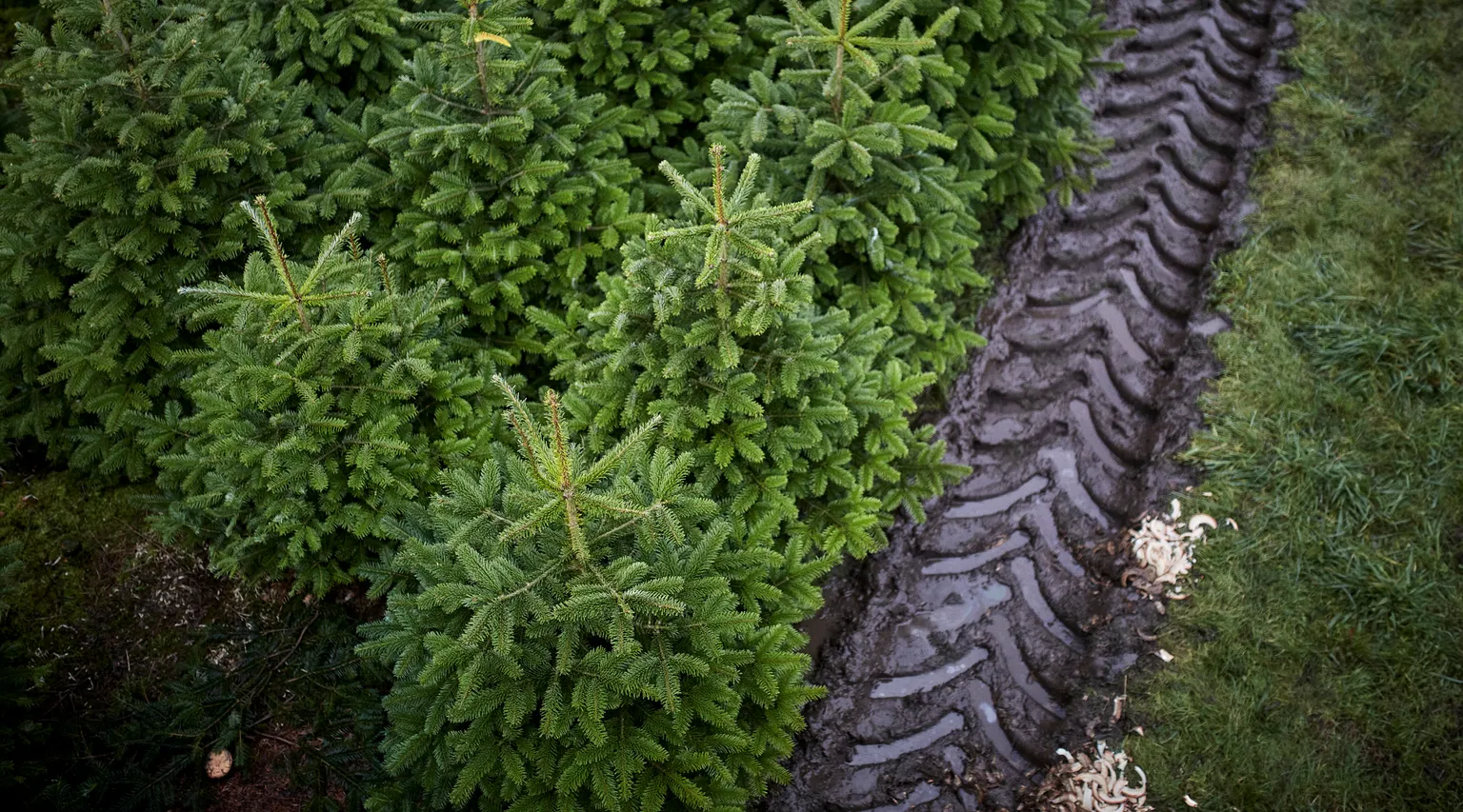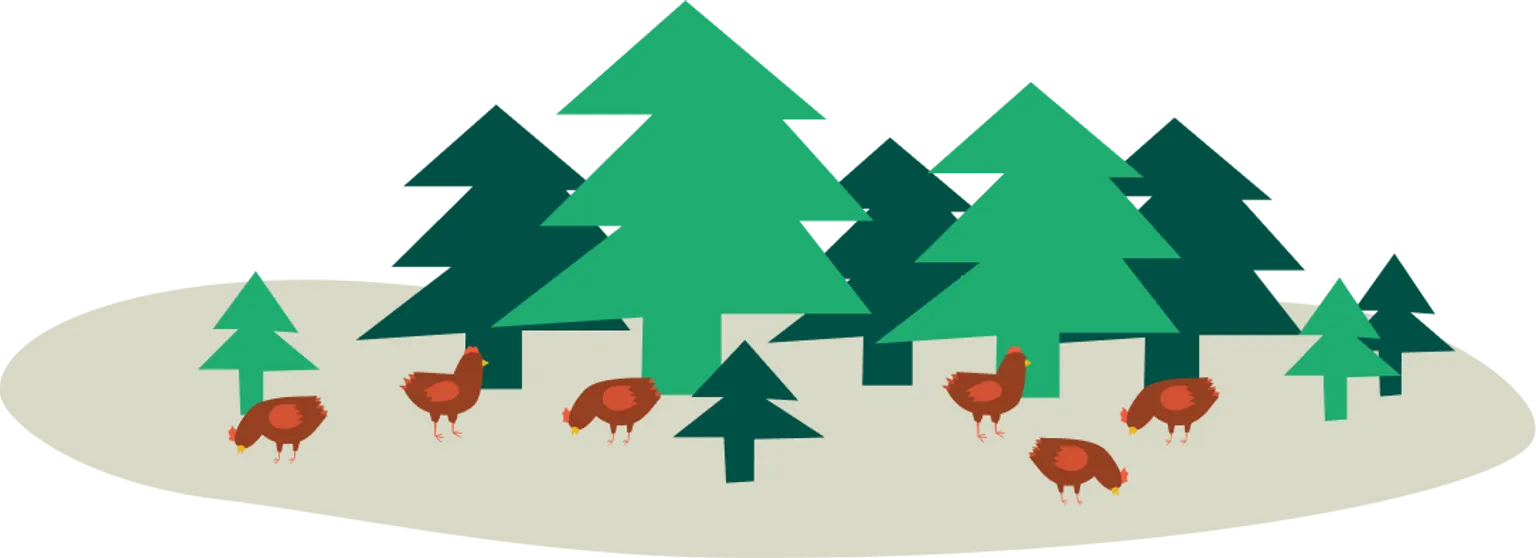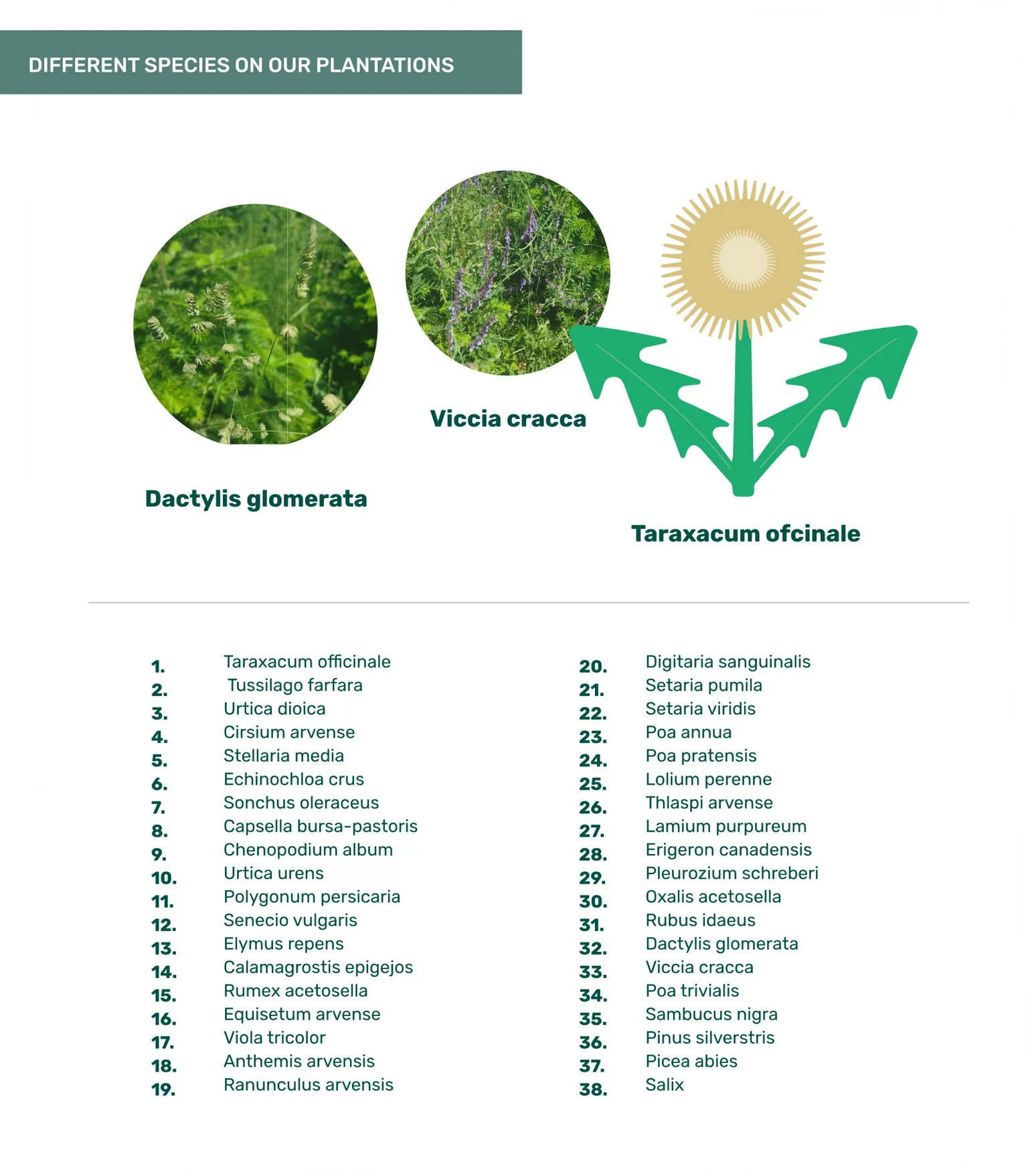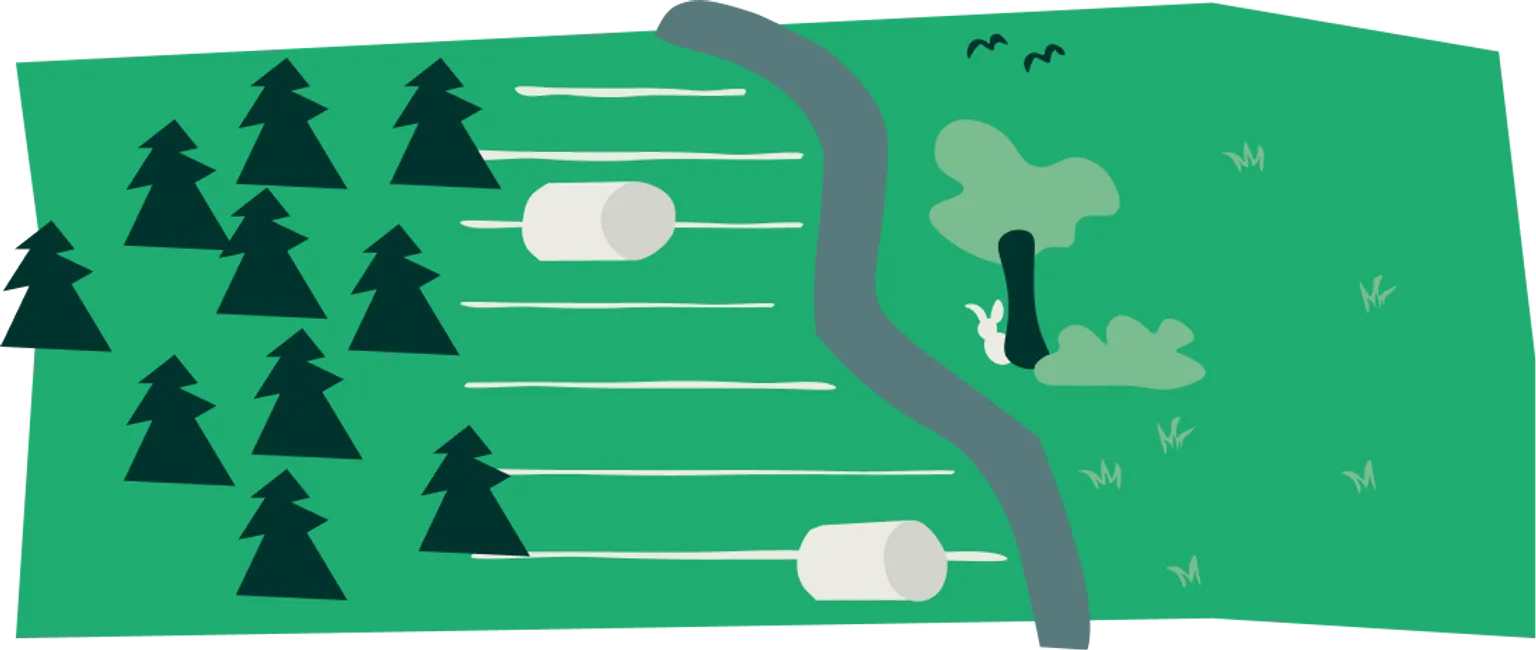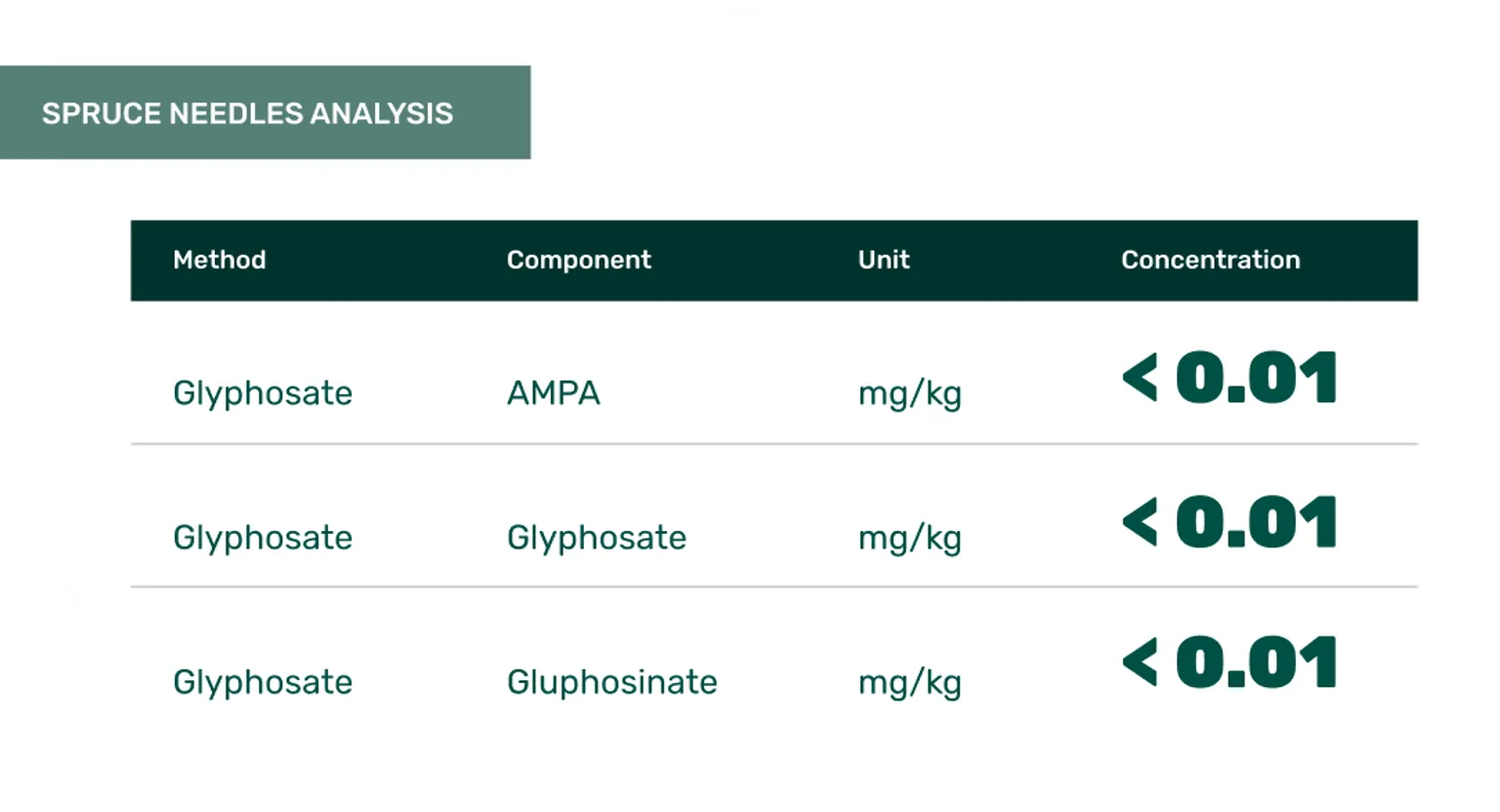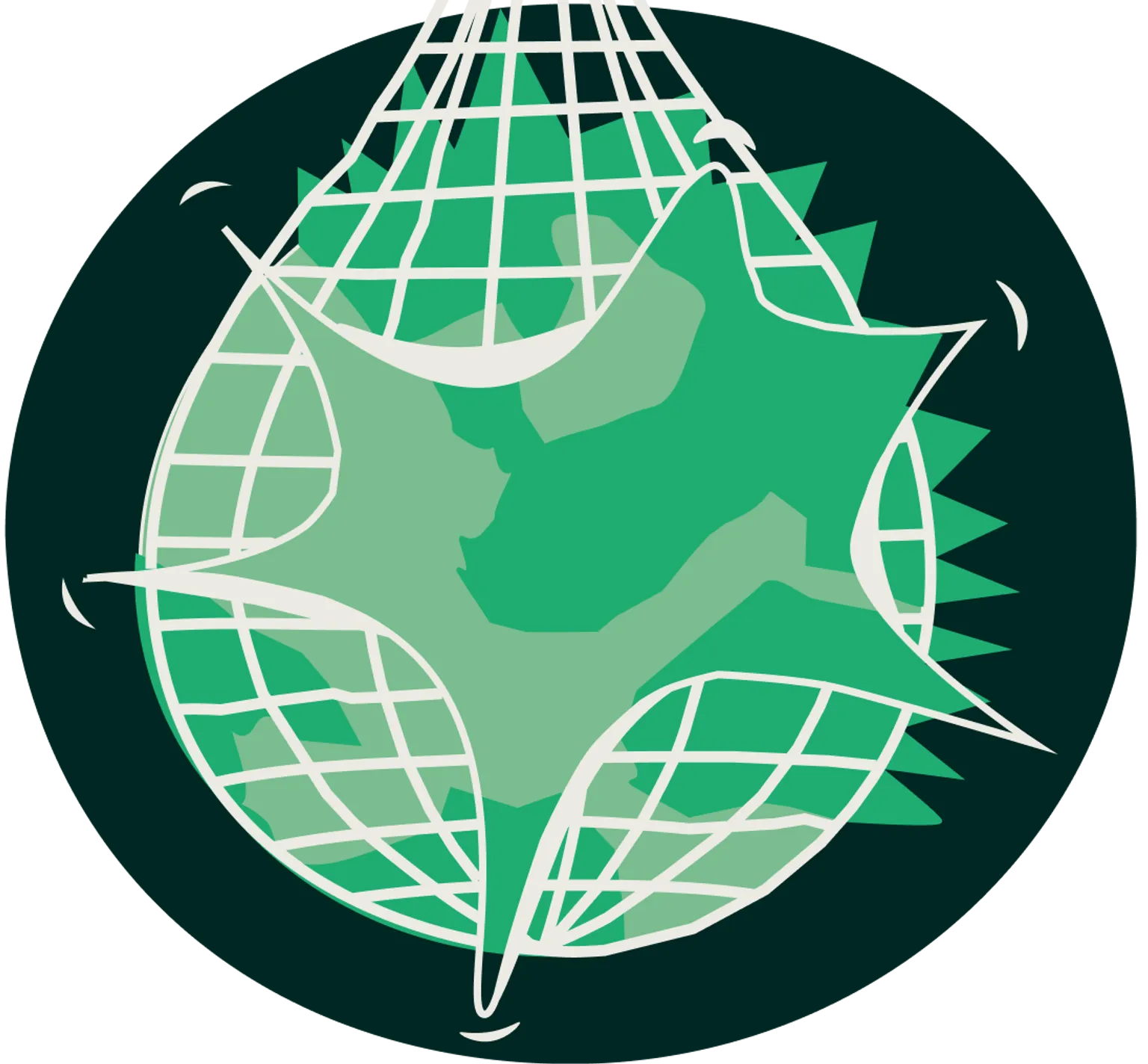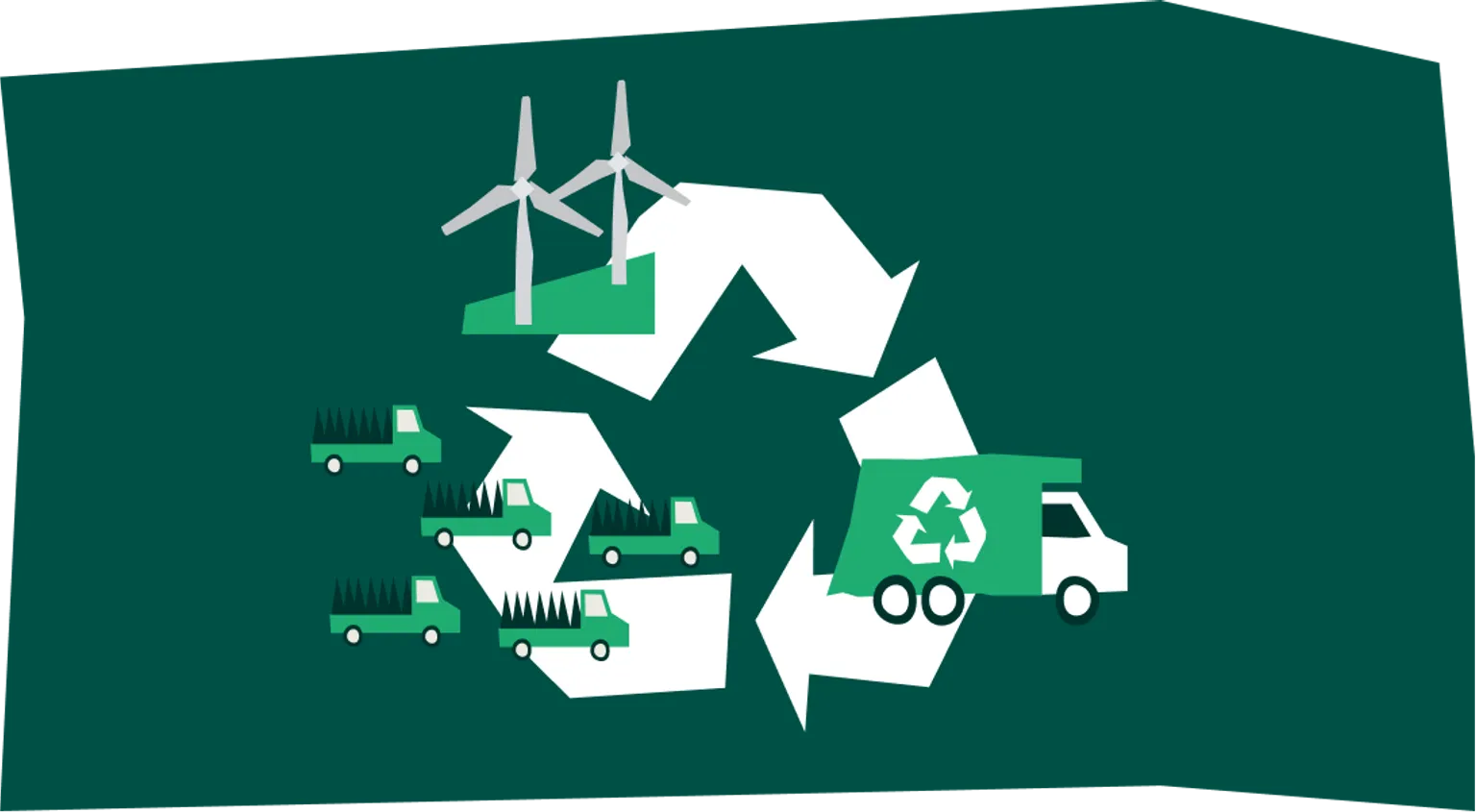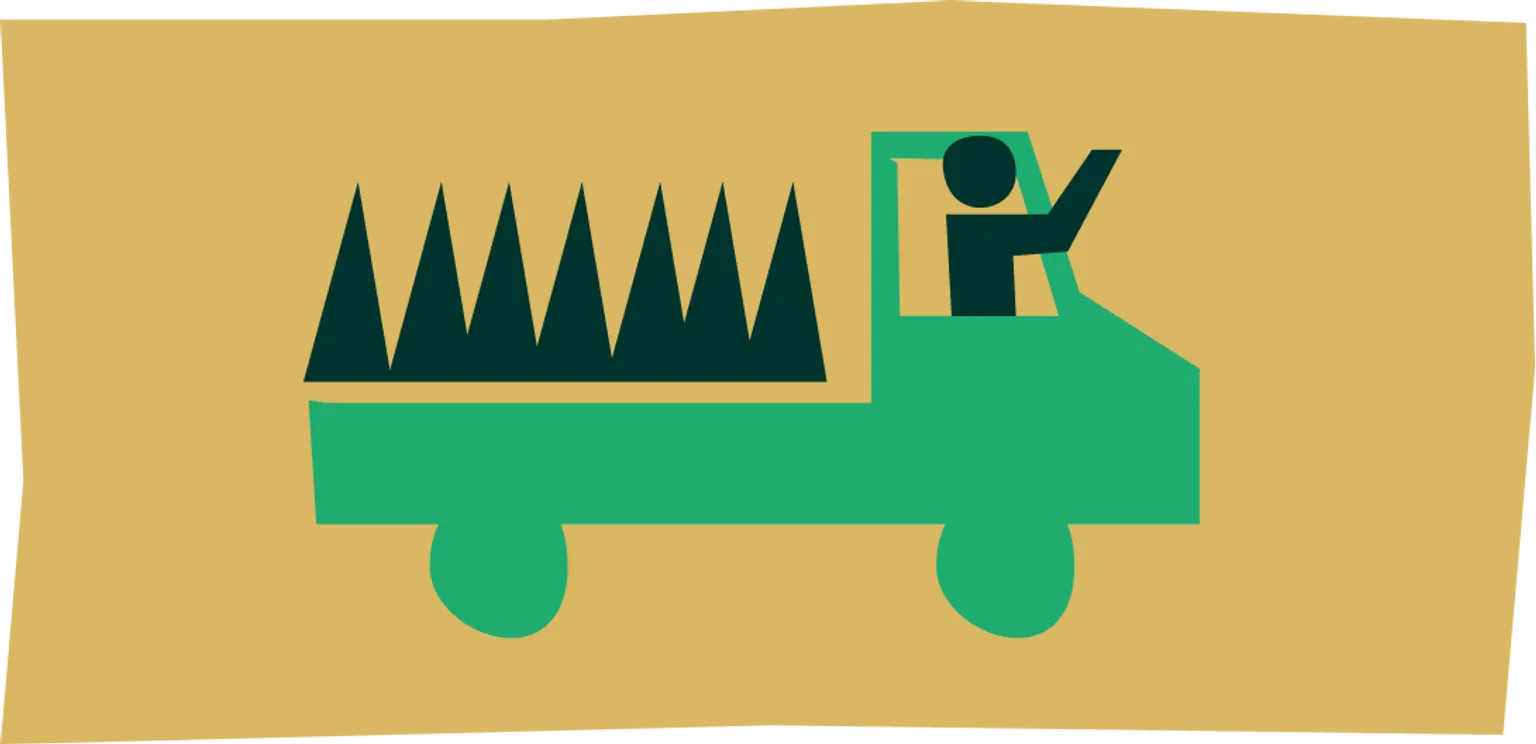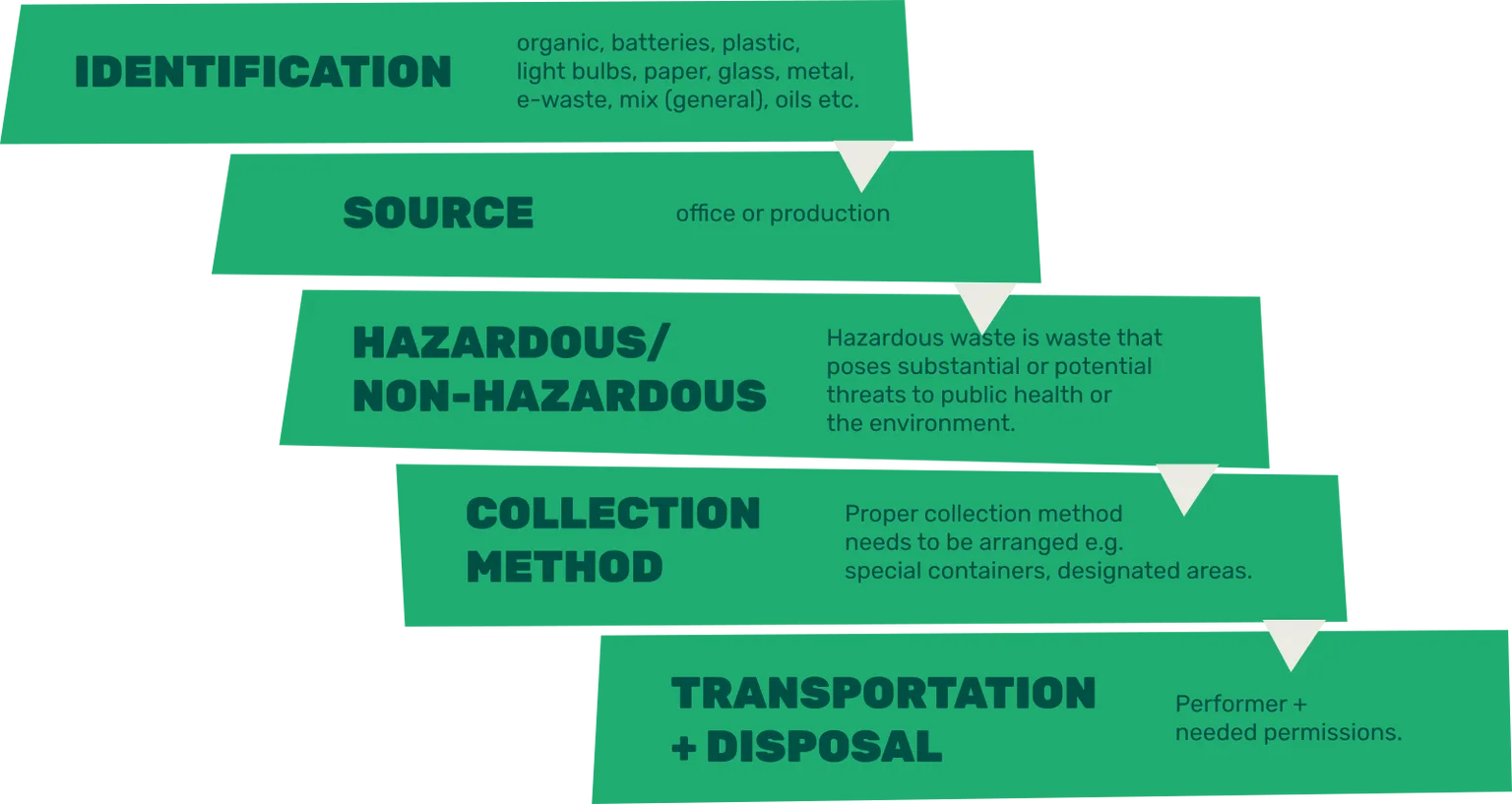CSR Report
Europe’s most responsible large producer of Christmas trees
Happy Habitat
Low-impact farming
”As little as possible” is how we approach this. We grow our trees with as little input as possible on all parameters without it affecting quality. This means, to name a large-scale example, carefully testing, analyzing and selecting the land we use for our plantations, searching for light, sandy soil with little weed propensity. But it also means, on a smaller scale, using biofuels and biooils in our chainsaws.
We are dedicated to reducing our use of fertilizer and we are experimenting with the use of natural fertilizer whenever possible and financially feasible. Often, the fertilizer isn’t essential for the production in itself but it affects the color of the Christmas trees in that it deepens the green, a feature which is thought of as attractive by many. We are looking into whether this feature can be retained through the use of natural fertilizer, possible from chickens.
We use specialized, fluid fertilizers and we only apply fertilizer when it is needed. There is still significant potential in the area of low-impact farming, which we are eager to continue exploring.
Nature-friendly farm practice
The biodiversity is under pressure all over Europe and insects and other invertebrates are among the species, which are suffering. However, as farmers controlling large areas of agricultural land, we can contribute a little bit to solving this very serious problem.
One of the things we can do is create insect banks around our fields with natural vegetation, where the insects can thrive, and which also function as peaceful homes for several species of birds because they are not disturbed by the farming. The banks have proven to be very efficient, and our goal is to create 10.000 meters of banks every year. In 2024 we have so far created 31.360 sqm.
We also sow strips of wildflowers to provide nourishment for bees and other insects. In 2024 we sowed 240.022 sqm of wildflowers in our plantations. Our goal is a minimum of 200.000 sqm per year.. In addition, we don’t mow the tram lines until August, because this enables us to not disturb the bees, butterflies and other insects or take away their food, while they are most active.
In addition, we don’t spray for pests unless there is a confirmed problem harming the trees. When that is the case, we spray in the evening, when most of the insects have settled down and are less likely to be harmed.
Our plantations are home to a very wide variety of species including 162 different types of plants and large mammals such as wolves and wild boar enjoying the peace and quiet. At least when compared with other crops such as corn, our fields are an oasis for most wildlife.
Planning for the Environment
We grow all our trees on regular farmland converting monoculture fields into a living place for many animals. This means that we never plant Christmas trees in forests, in Natura2000 areas or in any other habitats with high nature content.
One of the key features of sustainable farming is the continuous integration of site-specific knowledge and practical experience into future management planning and practices.
These practices are implemented:
Soil management and maintenance plans
Integrated pest management
Risk assessment management
Management and conservation plan
Risk assessment for each field before planting
We assess all sites registered for GLOBALG.A.P. certification including rented land, structures, and equipment
A risk assessment determines whether a site is suitable for production. It is inspected, maintained, updated, and reviewed when new sites enter in production and when risks for existing ones have changed, or at least annually, whichever is more frequent. In the assessment we consider potential physical, chemical (including allergens) and biological hazards, site history and impact of proposed enterprises on adjacent stock/crops/environment.
Farming and the environment are inseparably linked. Managing wildlife and landscape is of great importance. The abundance and diversity of flora and fauna benefits the enhancement of species and the structural diversity of land and landscape features. Our practices ensure that we act in accordance with this fundamental understanding.
Naturally natural christmas
Renewable resources
We aim to use renewable and sustainable resources whenever possible. One such area is plastics, and we are currently experimenting with ways to reduce our use of plastics. We are down 33 pct. in our pot tree production, and we use no plastic in our administration.
We are working together with our net supplier to develop nets, which are produced from biodegradable corn starch or other renewable material rather than plastic. This will be a significant step forward.
Green Team is also taking steps to replace the use of peat with more sustainable alternatives such as soil from recycling centers and coco peat. There is great potential in these measures although some work still needs to be done for some alternatives to become viable from a business perspective.
We are only using recyclable cardboard for boxing and all the tree used for our pallets is either FSC or PEFC-labelled.
Glyphosate-free production
In Green Team we always strive to have an as environment friendly production as possible, only spray if it absolutely necessary in order to grown the trees.
We also always look for alternatives and follow law and EU regulations
We have been searching for alternative methods, such as glyphosate-free herbicides, to keep weeds from being harmful to the trees, and we now monitor each field to decide specifically which approach to take on each field individual.
CO2-reduction
It is important for us to contribute to the reduction of CO2 in the atmosphere, and we aim to accomplish this through a variety of initiatives to correspond with our business activities. A Christmas tree “costs” 10 kilos of CO2 to produce, that is the equivalent of two steaks. However, the tree also collects about 18 kilos of CO2 as it grows.
Transporting the trees is a huge issue of course. First of all, we try, whenever possible, to sell locally produced trees. From 2021, in partnership with DHL, we also offer a carbon neutral transport solution, Going Green Team, which offsets both the CO2 and the carrier’s usage of water and electricity.
The projects selected and used to offset the CO2 are of very high quality, giving priority to developing countries to maximize the effect and focusing on energy, waste disposal and household devices.
We closely monitor and measure our CO2 emissions and as of 2021 we have converted our electricity to sustainable sources such as wind and solar. By 2024 we will have converted our car fleet to EV except work vehicles, tractors and other machinery. We also encourage carpooling whenever possible and continuously search for other relevant initiatives.
Bionet and Labels
In Green Team we already use little plastic in our production. We aim to bring our consumption even further down, most specifically in the use of labels and especially netting for the tree. All trees are put into net before being shipped. In fact, the European Christmas tree industry uses almost ½ million kilometers of plastic net every year, more than 10 times around the planet. In 2022 we bought 30,9t net, saving of 30,8t of plastic compared to purchase in 2021 (61,7t). 6,125km of net in 2022, 10,974km in 2021.
To change this, we are working with producers of net made from renewable, organic material such as corn starch, which is degradable, compostable, and ecological.
On our labels we have reduced from 7.774 kg to 5.877 kg reduction of 20 % by having some customers changing from hanging labels to Tywek labels. On 1 customer it is reduced with 1,2 tons just on the labels.
Circle of Life
Growing a Christmas tree takes at least 12 years. In those 12 years we work hard to improve the natural habitat and we convert regular farmland into small sanctuaries for the wildlife. A field of Christmas trees is home for a surprising number of different species when compared to all other farmlands even including areas of meadows for cattle and sheep. Our fields have many of the same properties as a pioneer forest where there is an abundance of food, shelter and sunlight.
Year 1. Collecting seeds from seed orchards, sowing the seeds to produce seedlings
Year 2 and 3. Transfer of the small seedling to a plant bed to develop for another year
Year 4 Seedlings now grow as Christmas trees. GPS coordinated planters put the plants in the right location
Year 5-8 its Growing up, the trees are left to themselves, only the necessary, small amount of fertilizer is applied to keep the damaging weed in check
Year 9-10 Shaping of the trees, bottom pruning and thinning
Year 11-12 Harvesting years for around 80 pct of the trees planted. The 20 pct. are mulched into the ground to provide nutrients for the next generation (only time the soil in the fields is touched)
Transportation
In Green Team we measure our CO2 footprint when the trees are on the road all the way to our customers. To deliver all our trees in 2023 we left a WtW footprint of 1.784,3 tons of CO2. The normal standard is to compensate for TtW (Tank to Wheel) but we want to make sure we have the whole chain covered.
We always strive to find the most efficient way for our trucks, making sure that the trucks are at least 90 pct. full or co-loaded with other customers’ goods to minimize the footprint. We work closely with our transporter, as it is important that our partner shares our mission and values. We continuously challenge our partner to identify potential improvements, in these areas among others:
When will it make sense to go by train instead of by truck?
When is the infrastructure mature enough to use electric trucks?
Not using fossil driven trucks
All trucks have GPS to make sure we do not drive unnecessary kilometers
In addition, we offer our customers to buy carbon credits, with a certificate to document the neutralization.
Satisfied Santa
Sustainable administration
What we do in terms of sustainability is not limited to our production, transportation etc. It involves all parts of our organization including our administration, which works to minimize impact and protect our environment as much as possible.
This for instance means no plastic in office supplies and the use of recycled paper. And that’s when we absolutely must print something, which we rarely do, as we try to stick to a principle of no printing.
We save water by installing water-saving toilets and using faucets with sensors, and we reduce our use of electricity by using sensors and timers with our lightning. Our canteens are ecological, and we continuously improve on the sustainability of our waste disposal.
These initiatives and several more, combined with the even more obvious ones such as limiting the number of plane tickets we buy, contribute to our mission of reducing our impact on the environment and being a force for increased sustainability in the production of Christmas trees.
Preserving Our Past
As farmers controlling rather large plantations it is only logical that we have several sites under our protection containing ancient monuments and other relics from our heritage. It is important for us to take good care of these culturally and historically significant places and objects and we do so in accordance with local regulations.
Keeping it Clean
It is important for us to have full transparency and accountability across our value chains. We actively lead our industry when it comes to anti-corruption initiatives as well as the prevention of tax avoidance and similar criminal activities.
We have advanced management information systems allowing, even enforcing, full financial control of our processes. We run a no-cash operation to minimize the risk of fraud, and we frequently monitor and check that there are no irregularities.
Don’t let it go to waste
When it comes to waste management, we are quite ambitious. We have developed a system for waste management, which reduces the impact of waste as much as possible through an elaborate process for correct sorting and handling. Our processes are always more ambitious than local regulations.
We use a variety of collection methods in accordance with regulations as well as our own best practice standards and the nature of the waste, i.e., hazardous or non-hazardous, potential for re-use etc. This approach corresponds well with our intention to minimize our negative impact and our continuous investigation into new and more sustainable ways to produce Christmas trees.
We work with partners who are experts in this field as well as with local authorities and, to indicate how widely we understand the term waste, last year we had less than 0,5 pct. waste trees left on our loading grounds.
Our team
Green Team is first and foremost the team, our employees, and we are a diverse bunch of people. We come from eight different countries, and we speak 7 different languages.
We are also a young company; our average age is only 43,3 years which is very low in our business, and we have reached our 40 pct gender target employing 42 pct. women. 30 pct. of our female employees are in managerial positions.
We think of this diversity as a huge advantage for our company in many respects. Specifically we genuinely believe that our diversity helps us understand the different cultures of our quite diverse market a little better
Certainly Certified
Quality First
At the core of our business is the quality of our product. We need to know for sure that the quality is as high as we claim, which is why we have developed the market’s best quality control. We have developed our own quality control apps, we deliver highly detailed quality descriptions to our customers, and we make sure that it isn’t just ourselves saying it by organizing recurring external quality checks.
In fact, last year we conducted more than 7000 quality controls of all relevant parameters. Whenever there is a deviation from the agreed quality standard, there is also a corresponding action to make sure that the problem is solved.
It’s Certified
Green Team is certified by the following external organizations: ETI Base code, PEFC Trading, ISO28000;2022, GlobalG.A.P., SMETA, UN Global Compact, GRASP, MPS-ABC and Naturbaum Siegel.
It is quite a task to accomplish this, delivering on more than 2000 control points. And we don’t do it for the prestige. We do it to document our work and to document that we care about the environment, about our employees and about our organization and the world around it every day.
It’s an important way to say that as a company we walk the talk, and we often find ourselves as first movers in the various certification programs. They all demonstrate our commitment to superior professionalism and to upholding industry standards.
They require regular self-assessments, internal audits and management reviews, and they are quite literally a stamp of approval from insightful external organizations.
